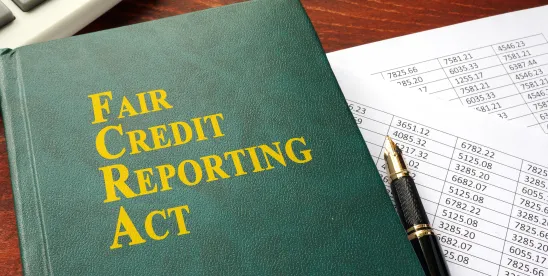The entire spectrum of furnishers – from national banks to fintechs, finance companies to servicers, debt purchasers to collection agencies – have faced a recent onslaught of cases filed by consumers under the Fair Credit Reporting Act (“FCRA”). As the defendants in these cases fight back, however, courts have repeatedly dismissed claims where plaintiffs are unable to plausibly allege basic facts that are sufficient to support the essential elements of a FCRA claim. A closer examination of each FCRA complaint may reveal similar shortcomings.
First, it is worth repeating a fundamental (but counterintuitive) fact about the FCRA: although section 1681s-2(a) of the statute obligates furnishers to report complete and accurate information about consumers, the Act does not give consumers the right to sue furnishers for a breach of that duty. This is true even when consumers directly notify furnishers they dispute the information that is being reported and the furnisher fails to correct or delete the information.1 Thus, courts routinely dismiss claims that simply allege a furnisher has breached the duty to report accurate information about them.2
Next, although consumers do have standing to pursue claims under section 1681s-2(b) of the FCRA, the pleading requirements of those claims are very specific. The consumer must allege facts which, if proven true, would show the furnisher’s inaccurate information appeared on their credit report, they notified a consumer reporting agency of that inaccuracy, the consumer reporting agency notified the furnisher about the dispute, and the furnisher thereafter failed to conduct a reasonable investigation and failed to update or correct its reporting as necessary.3 Information is only “inaccurate” within the meaning of the FCRA if it is patently incorrect, or is misleading in such a way and to such an extent that it can be expected to adversely affect credit decisions.4 Each of these requirements has proven to be a stumbling block for consumers.
Thus, courts have dismissed cases where consumers have listed information they claim is inaccurate (for example, the “past due amount” field is blank), but have failed to plausibly allege facts explaining why the information is patently incorrect or likely to adversely impact credit decisions.5
Other courts have dismissed cases where consumers claim they disputed the information directly with furnishers, or with the furnisher’s attorneys, but do not allege they submitted a dispute to the consumer reporting agencies.6
Dismissal orders also have been issued where the consumer did not plausibly allege facts indicating the consumer reporting agency notified the furnisher of the dispute, or facts (as opposed to bare legal conclusions) indicating the furnisher failed to conduct a reasonable investigation after receiving notice through the consumer reporting agencies.7
Courts have dismissed cases where consumers have not plead any facts which, if proven true, would prove they were damaged by the information reported. Speculative allegations of damage, including claims that the reporting had a “chilling effect” on the consumer’s applications for credit or use of credit, are not sufficient.8
Lastly, when consumers have attempted to assert state law claims (such as defamation or negligence) against furnishers who allegedly reported inaccurate information, or allegedly failed to investigate or correct information, courts have correctly dismissed these claims as preempted by section 1681t(b)(1)(F)(ii) the FCRA. State law claims of this type, when filed against furnishers, are inconsistent with Congress’ intent to create a uniform federal regulatory scheme governing credit reporting obligations.9
The pace of new FCRA lawsuits filed against furnishers shows no sign of slowing down. In this environment, furnishers who are targeted by FCRA claims should closely analyze the allegations made against them to assess whether the consumer has asserted specific facts to support each element of a viable FCRA claim.
1See, e.g., Nelson v. Chase Manhattan Mortgage Co., 282 F.3d 1057, 1059-60 (9th Cir. 2002) (noting that Congress “did not want furnishers of credit information exposed to suit by any and every consumer dissatisfied with the credit information furnished,” and for this reason Congress “limited the enforcement of the duties imposed by § 1681s-2(a) to governmental bodies.”).
2See, e.g., Khankin v. JLR San Jose, LLC, 2024 U.S. Dist. LEXIS 89507 (N.D. Cal. May 17, 2024) (dismissing § 1681s-2(a) claim against furnisher); Matthews v. Ally Bank, 2024 U.S. Dist. LEXIS 83803 (N.D. Ga. May 7, 2024) (“To the extent that Plaintiff is contending that Defendant violated the FCRA simply by submitting inaccurate information about his account to CRAs, he cannot bring a private right to action to address such a violation and thus that claim would not be viable.”).
3See Gorman v. Wolpoff & Abramson, LLP, 584 F.3d 1147 (9th Cir. 2009).
4Gorman, 584 F.3d at 1163.
5Novitzky v. TransUnion LLC, 2024 U.S. Dist. LEXIS 67472 (C.D. Cal. April 11, 2024) (“Plaintiff fails to explain why it is inaccurate for the past due amount to be blank, a showing that is required because the absence of past due information is not necessarily inaccurate—for example, Plaintiff might not owe a balance on this account.”).
6McGee v. Wells Fargo Bank N.A., No. 3:23-CV-437-RGJ, 2024 WL 1119420 (W.D. Ky. Mar. 14, 2024) (dismissing § 1681s-2(b) claim where plaintiff sent dispute directly to furnisher: “It is settled that as a furnisher Synchrony has a duty to investigate only after receiving a request from a CRA”); Khankin v. JLR San Jose, LLC, 2024 U.S. Dist. LEXIS 89507 (N.D. Cal. May 17, 2024) (“While Plaintiffs allege they gave Chase notice of the dispute, Plaintiffs do not allege Chase ever received notice of the dispute from a Credit Reporting Agency.”); King v. PennyMac Loan Servs., LLC, 2024 U.S. Dist. LEXIS 84023 (E.D. Wash. May 8, 2024) (“Without the allegation that Ms. King notified a CRA, she fails to state a legally cognizable claim for relief under the FCRA.”).
7Novitzky v. TransUnion LLC, 2024 U.S. Dist. LEXIS 67472 (C.D. Cal. April 11, 2024) (“Plaintiff fails to overcome the fact that the SAC does not contain any factual allegations that could support his legal conclusion that Wells Fargo's investigation was inadequate.”); Khankin v. JLR San Jose, LLC, 2024 U.S. Dist. LEXIS 89507 (N.D. Cal. May 17, 2024) (“Plaintiffs also fail to allege any facts indicating Chase failed to investigate or that the investigation it conducted was unreasonable.”); Alexander v. Acceptance NOW, 2024 U.S. Dist. LEXIS 78721 (WD. Pa. April 30, 2024) (“Because Alexander has not alleged that a CRA notified TBOM/OLLO of his dispute or that, upon receipt of such notice, TBOM/OLLO failed to investigate the dispute, his Complaint fails to state a § 1681s-2(b)(1) claim against TBOM/OLLO.”)
8See Naimi-Yazdi v. JPMorgan Chase Bank, N.A., No. 5:21-CV-04390-EJD, 2022 WL 2307068, at *3 (N.D. Cal. June 27, 2022) (dismissing negligent FCRA claim because, inter alia, “alleged chilling effect on future credit applications and loss of beneficial use of credit are too speculative”).
9Khankin v. JLR San Jose, LLC, 2024 U.S. Dist. LEXIS 45473, at *11-12 (N.D. Cal. Mar. 14, 2024) (noting that the “total preemption approach best aligns with the statutory text and congressional intent” and observing the “legislative history demonstrates that Congress enacted section 1681t(b)(1)(F) in order to create a uniform scheme governing the disclosure of credit information. . . Allowing common law tort claims which implicate the same subject matter as section 1681s-2(b)(1) would undermine Congress' intention to create a uniform system of protection for consumers.").





 />i
/>i
